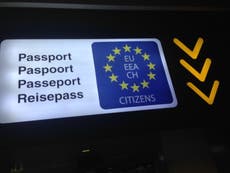Brexit: UK poised to lose access to security databases in event of no-deal, Raab admits
‘There are certainly instruments that we may not have access to’, Foreign Secretary says - after police chiefs warned of ‘major impact on counter-terrorism’
Your support helps us to tell the story
From reproductive rights to climate change to Big Tech, The Independent is on the ground when the story is developing. Whether it's investigating the financials of Elon Musk's pro-Trump PAC or producing our latest documentary, 'The A Word', which shines a light on the American women fighting for reproductive rights, we know how important it is to parse out the facts from the messaging.
At such a critical moment in US history, we need reporters on the ground. Your donation allows us to keep sending journalists to speak to both sides of the story.
The Independent is trusted by Americans across the entire political spectrum. And unlike many other quality news outlets, we choose not to lock Americans out of our reporting and analysis with paywalls. We believe quality journalism should be available to everyone, paid for by those who can afford it.
Your support makes all the difference.The UK is poised to lose the ability to share vital security data if there is a no-deal Brexit, Dominic Raab has admitted – but he denied that meant Britons will be “less safe”.
“There are certainly instruments that we may not have access to,” the Foreign Secretary said – ahead of a crunch decision whether to abandon the negotiations today.
Among the databases the UK could be shut out of are SIS II, recording suspected terrorists and major criminals, live passenger records and DNA, fingerprint and vehicle registration details.
But Mr Raab insisted the “big win” was control of UK borders, claiming: “That will mean we are more secure and more safe.”
Until now, ministers have ducked questions about what will happen to security data after a crash-out Brexit, as the talks have largely concentrated on the future trade terms.
On the BBC’s Andrew Marr Programme, Mr Raab was reminded that the police had warned that losing access to passenger records would “have a major impact on counter-terrorism and serious and organised crime”.
But he argued it was a “finely-balanced call”, because of the wider security benefits of ending the free movement of EU citizens into the UK.
And he claimed: “The EU has always said, even with a free trade deal, we won’t have access, for example, to the SIS databases.”
In fact, police and terror chiefs hoped to retain the ability to share that data if there is a deal, even if the process became slower and more cumbersome.
The UK alone has placed more than 4 million alerts on SIS II and forces used it a staggering 603 million times last year.
Last month, police said they were scrambling to save the vital details of suspected criminals and missing people on SIS 11, with names “double keyed” into the Interpol system.
On the trade talks, Mr Raab warned the EU would have to move “a long way” for the talks to succeed now, attacking its “outlandish” demands which “don't get more reasonable by repetition”.
He attacked the threat of a “torpedo of tariffs which threatens the relationship in the future”, reflecting the UK anger that the EU wants to impose unilateral punishments for perceived rule breaches.
Mr Raab said London wanted “to narrow the issues if any disputes arise in the future”, hinting it might accept the threat of tariffs restricted to a particular sector.
But he criticised “a nuclear-style type reaction”, of wider tariffs that “go up and we are back in the same old drama and soap opera every couple of years or even sooner than that, just because there is a particular issue around a particular sector”.
“I think it is about making sure that we’ve got a relationship that we can preserve and nurture that isn’t actually going to continue to be a thorn in both our sides,” the Foreign Secretary said.




Join our commenting forum
Join thought-provoking conversations, follow other Independent readers and see their replies
Comments